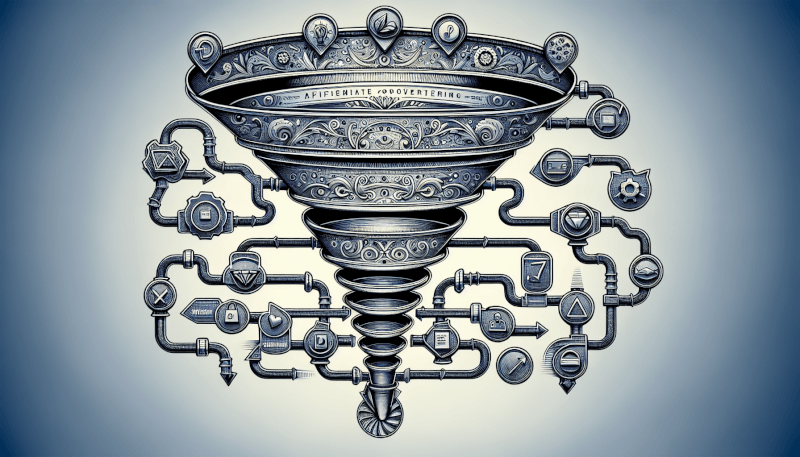In this article, you will explore the fascinating world of affiliate marketing and gain a deeper understanding of its conversion funnel process. With a friendly tone, we will unravel the mysteries behind this marketing strategy and explain how it can help you boost sales and increase your online presence. Get ready to navigate through the intricate steps of the affiliate marketing conversion funnel and discover the secrets to attracting, engaging, and converting your target audience. Exciting opportunities lie ahead, so let’s dive right in!

What is Affiliate Marketing?
Affiliate marketing is a performance-based marketing strategy where individuals or businesses, known as affiliates, earn a commission by promoting products or services of another company. This type of marketing operates on the principle of revenue sharing, where the affiliate is rewarded for each customer or sale generated through their promotional efforts. It is a win-win situation, where both the merchant and the affiliate benefit from the collaboration.
Importance of Understanding the Conversion Funnel
Understanding the conversion funnel is crucial for success in affiliate marketing. The conversion funnel, also known as the sales funnel, is a step-by-step process that individuals go through from the moment they become aware of a product or service to the final purchase decision. By comprehending each stage of the conversion funnel, affiliates can effectively tailor their marketing strategies to guide potential customers towards making a purchase.

Stages of the Affiliate Marketing Conversion Funnel
Awareness Stage
The awareness stage is the first and most important stage of the conversion funnel. At this stage, the goal is to make potential customers aware of the existence and benefits of a product or service. Affiliates can leverage various techniques such as content marketing, social media promotion, and influencer collaborations to reach a wide audience and build initial interest in the product.
Interest Stage
Once potential customers are aware of the product, the interest stage comes into play. Here, the focus is on capturing their attention and generating genuine interest. Affiliates can identify their target audience and create engaging content such as blog posts, videos, or social media posts to provide valuable information and create a desire for the product or service.
Consideration Stage
At the consideration stage, potential customers are evaluating different options and considering which product or service best suits their needs. Affiliates can nurture consideration by providing detailed information about the product, offering product comparisons and reviews, and building trust and credibility through testimonials. This stage is crucial in influencing the final purchase decision.
Decision Stage
The decision stage is where potential customers make the final decision to purchase or not. Affiliates can use strategies such as creating urgency and scarcity, offering discounts or deals, and continuing to build trust through testimonials to encourage potential customers to take the desired action and make a purchase.
Action Stage
The action stage is the ultimate goal of the conversion funnel. It is when potential customers take the desired action, such as making a purchase, signing up for a service, or subscribing to a mailing list. Affiliates can drive this action by implementing effective call-to-action strategies, simplifying the purchase process, and tracking and analyzing conversions to optimize their marketing efforts.
Creating Awareness in the Conversion Funnel
Building a Brand
Building a brand is a fundamental aspect of creating awareness in the conversion funnel. Affiliates should establish a unique brand identity that resonates with their target audience. This can be achieved by designing a visually appealing and professional website, creating a strong brand message, and consistently delivering value through content.
Content Marketing
Content marketing is a powerful tool for creating awareness in the conversion funnel. Affiliates should focus on creating high-quality and informative content that addresses the needs and interests of their target audience. By consistently producing valuable content through blog posts, videos, podcasts, or social media posts, affiliates can establish themselves as thought leaders in their niche and attract a larger audience.
Social Media Promotion
Social media platforms offer a vast reach and are an effective way to promote products and services. Affiliates should utilize social media marketing strategies to increase brand visibility and engage with their target audience. By creating shareable content, running targeted ad campaigns, and collaborating with influencers, affiliates can generate awareness and drive traffic to their affiliate links.

Generating Interest in the Conversion Funnel
Identifying Target Audience
One of the key factors in generating interest in the conversion funnel is identifying the target audience. Affiliates should conduct thorough market research to understand the demographics, interests, and pain points of their target audience. This information helps affiliates create content and promotional strategies that resonate with potential customers and generate genuine interest in the product or service.
Creating Engaging Content
To generate interest, affiliates should create engaging and captivating content that grabs the attention of potential customers. This can be achieved by storytelling, incorporating visuals and multimedia, and addressing the pain points and desires of the target audience. By providing valuable and unique content, affiliates can differentiate themselves from competitors and build a loyal following.
Offering Incentives
Offering incentives is an effective way to generate interest in the conversion funnel. Affiliates can provide exclusive discounts, free trials, or special bonuses to potential customers. By offering something of value, affiliates can entice potential customers to explore the product or service further and increase the likelihood of conversion. Incentives can create a sense of urgency and give potential customers an extra push towards making a purchase.
Nurturing Consideration in the Conversion Funnel
Providing Detailed Information
At the consideration stage, potential customers require detailed information about the product or service of interest. Affiliates should provide comprehensive product descriptions, specifications, and use cases to assist potential customers in their decision-making process. By offering all the necessary information, affiliates can help potential customers make an informed decision and build trust in the product or service.
Product Comparisons and Reviews
Product comparisons and reviews are powerful tools for nurturing consideration in the conversion funnel. Affiliates should perform thorough product research and provide honest and unbiased comparisons and reviews. By highlighting the unique features, benefits, and drawbacks of different products, affiliates can guide potential customers towards making a well-informed decision.
Building Trust and Credibility
Building trust and credibility is essential in the consideration stage of the conversion funnel. Affiliates can achieve this by showcasing testimonials and success stories from satisfied customers. Additionally, affiliating with reputable brands and displaying trust indicators such as secure payment options and privacy policies can further enhance trust and credibility. Building strong relationships with potential customers through personalized communication and excellent customer service also plays a vital role in establishing trust.

Converting Decision in the Conversion Funnel
Creating Urgency and Scarcity
Creating a sense of urgency and scarcity is crucial for converting the decision in the conversion funnel. Affiliates can leverage limited-time offers, countdown timers, or exclusive deals to create a perception of urgency. Additionally, highlighting the limited availability of the product or service can trigger a fear of missing out in potential customers, motivating them to make a prompt decision.
Offering Discounts or Deals
Offering discounts or deals can significantly influence the decision-making process in the conversion funnel. Affiliates can negotiate exclusive discounts or promotions with the merchant and pass on the benefits to potential customers. By providing added value and making the product or service more affordable, affiliates can entice potential customers to convert.
Building Trust through Testimonials
Testimonials play a vital role in building trust and confidence in potential customers. Affiliates should showcase testimonials from satisfied customers who have already made the purchase. By highlighting the positive experiences and outcomes of others, potential customers are more likely to trust and feel confident in their decision to make a purchase.
Driving Action in the Conversion Funnel
Call-to-Action Strategies
Effective call-to-action (CTA) strategies are crucial for driving action in the conversion funnel. Affiliates should create clear and compelling CTAs that prompt potential customers to take the desired action. CTAs should be specific, visually appealing, and placed strategically in the content or landing page. By guiding potential customers through the action process, affiliates can increase the conversion rate.
Simplifying the Purchase Process
The purchase process should be simple and user-friendly to encourage potential customers to take action. Affiliates should optimize the checkout process by minimizing the number of steps, offering multiple payment options, and providing clear instructions. By eliminating any potential barriers or frustrations, affiliates can ensure a seamless and convenient purchase experience.
Tracking and Analyzing Conversions
Tracking and analyzing conversions is essential for measuring the success of the affiliate marketing efforts. Affiliates should use tracking tools, such as affiliate tracking software or Google Analytics, to monitor the performance of their campaigns and track the number of conversions generated. By analyzing the data, affiliates can identify areas for improvement and optimize their marketing strategies for better results.

Optimizing the Conversion Funnel for Increased Success
Split Testing and Optimization
Split testing, also known as A/B testing, is a valuable technique for optimizing the conversion funnel. Affiliates should test different variations of their landing pages, CTAs, and promotional strategies to determine which ones perform better. By analyzing the results and making data-driven decisions, affiliates can continually improve their conversion rates and maximize their earnings.
Tracking Key Metrics
Tracking key metrics is crucial for understanding the effectiveness of the affiliate marketing campaigns. Affiliates should monitor metrics such as click-through rates, conversion rates, average order value, and return on investment. By consistently tracking these metrics, affiliates can identify trends, measure the impact of different strategies, and make informed decisions to optimize their campaigns.
Continual Improvement
Continual improvement is the key to long-term success in affiliate marketing. Affiliates should regularly review their strategies, adapt to changes in the market, and stay updated on industry trends. By seeking out new opportunities, expanding their knowledge, and constantly evolving their marketing efforts, affiliates can maximize their earning potential and achieve sustained success.
Conclusion
Understanding the conversion funnel is paramount for success in affiliate marketing. By comprehending the stages of the funnel and implementing effective strategies, affiliates can drive potential customers through each stage and ultimately achieve their desired action. Building awareness, generating interest, nurturing consideration, converting the decision, and driving action are all integral parts of the affiliate marketing conversion funnel. By optimizing this process and continually improving their strategies, affiliates can unlock increased success and maximize their earning potential.


